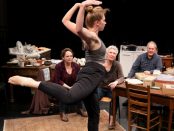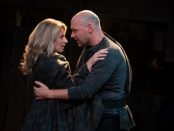Joan Marcus
Joan Marcus is one of the preeminent theatrical photographers working in the US today. Over the past 25 years she has photographed over 500 shows on and off Broadway and regionally. A native of Pittsburgh, Pennsylvania, Joan graduated from George Washington University. In 2014 she received a Tony Honor for Excellence in the Theater. Joan Marcus is married to the theatrical press agent Adrian Bryan-Brown of Boneau/Bryan-Brown, a leading Broadway press agency. http://www.joanmarcusphotography.com/
If it sounds challenging to do a two-performer version of "Frankenstein," it proves just that in the current production at the CSC, being performed in repertory with a new stage version of "Dracula." As adapted by Tristan Bernays from the novel by Mary Shelley, the first half-hour of the 80-minute show is more like performance art than a play, as very few words are spoken. During the first part of the play, there are more grunts and groans than there is anything resembling a script. [more]
Where We Stand
Amidst the hubbub that includes coerced audience clapping and singalongs, we attempt to discern what the point is. It appears to be the story of an outsider who takes up residence in a rural locality and is accused of a crime; the audience votes whether to convict or acquit him. Several audience members have been given pages of lofty speeches to recite. “The words your fellow Townspeople quoted come from Dr. Cornell West and Coretta Scott King,” states the program. Where We Stand’s 70 minutes are mildly engaging if often baffling and do make some impact. [more]
Grand Horizons
Bess Wohl's "Grand Horizons" opens with a pas de deux of marital inertia as Nancy (Jane Alexander) and Bill (James Cromwell), two near-octogenarians wasting their twilight days in a so-called independent living community, wordlessly go through the motions of sitting down to dinner. Their silence, and apparently 50-year marriage, are finally both broken when Nancy dispassionately declares that she "would like a divorce" and with equal nonchalance Bill responds, "All right." Confidently staged, or rather choreographed, by director Leigh Silverman, it's an extraordinary scene that, in truth, could stand alone as its own very brief play with the audience, possibly to its experiential chagrin, imaginatively filling in everything that came before. [more]
A Soldier’s Play
David Alan Grier, Blair Underwood and Billy Eugene Jones in a scene from Charles Fuller’s “A [more]
Miss America’s Ugly Daughter: Bess Myerson & Me
More in the spirit of Carrie Fisher than Christina Crawford, performer Barra Grant chronicles her life and that of her famous mother in her engaging and smartly presented self-written solo show, "Miss America's Ugly Daughter: Bess Myerson & Me." Nostalgic New Yorkers will have their memories refreshed while others might be delightfully informed. It’s a harrowing, insightful and often very funny 90 minutes. [more]
ON THE PASSING OF THE NEW YORK MUSICAL FESTIVAL…
The festival has given birth to musicals that have gone on to Broadway ("Next to Normal," "Chaplin," "[title of show]," "In Transit") and Off-Broadway ("Altar Boyz," "The Other Josh Cohen," "My Vaudeville Man," "Yank!," "Cyclops," "Bedbugs," etc.) Its shows have been produced in all 50 states and in 27 countries.Productions launched at the festival have won one Pulitzer Prize, three Tony Awards, three Obie Awards, and seven Drama Desk Awards. That’s a terrific track record. [more]
The Thin Place
After pillaging Ibsen in "A Doll's House, Part 2" and lampooning the former First Couple for "Hillary and Clinton," vaunted playwright Lucas Hnath’s latest piffle, "The Thin Place" is a Wallace Shawn-style talkathon aptly dedicated to the late magician Ricky Jay as it’s an exercise in flimflam. There is more craft and profundity in the first season "I Love Lucy" episode “The Séance” with its immortal lines, “Ethel to Tillie. Ethel to Tillie. Come in Tillie.” [more]
A Bright Room Called Day
Maddeningly alternating between being an absorbing historical drama and a grating exercise in self-indulgence, "A Bright Room Called Day" is author Tony Kushner’s reimagining of his 1985 first play. “It never worked” states a character regarding the play. It still doesn’t, but parts of it are entrancing. In contrast to his gargantuan two-part opus, "Angels in America," this runs a tolerable two hours and 45 minutes including an intermission. [more]
A Christmas Carol
Campbell Scott as Ebenezer Scrooge and Dashiell Eaves as Bob Cratchit in a scene from Jack [more]
Fires in the Mirror
The Reverend Al Sharpton, Angela Davis, and Sonny Carson are among the two dozen celebrities, cross section of New Yorkers, and male and female integral figures of diverse ethnicities that are given astounding portrayals by actor Michael Benjamin Washington. These simulations occur during this bedazzling revival of conceiver and writer Anna Deavere Smith’s acclaimed 1992 solo play about the Crown Heights Riots, "Fires in the Mirror." [more]
For Colored Girls Who Have Considered Suicide/When the Rainbow Is Enuf
Seven vibrant and diverse women of color take the stage and speak, sing and dance at the start of this shining revival of author Ntozake Shange’s landmark play, "For Colored Girls Who Have Considered Suicide /When the Rainbow Is Enuf." They’re wearing costume designer Toni-Leslie James’ beautiful fluorescent dresses, each in a different color, and some have regal headpieces. The dynamic cast of Sasha Allen (Lady in Blue), Celia Chevalier (Lady in Brown), Danaya Esperanza (Lady in Orange), Jayme Lawson (Lady in Red), Adrienne C. Moore (Lady in Yellow), Okwui Okpokwasili (Lady in Green), and Alexandria Wailes (Lady in Purple) vividly perform Ms. Shange’s self-invented “choreopoem,” a theatre piece embracing poetry, movement, and music. Each of these magnetic performers brings distinction and individuality to their roles. [more]
The Michaels
Richard Nelson’s latest play, "The Michaels" (subtitled a “Conversation During Difficult Times”) is a thing of beauty. Low-key like his "Apple Family" quartet and his "The Gabriels" trilogy, it is Chekhovian in the best sense of the word: very little happens but life passes by. The characters who sit in a Rhinebeck, New York, kitchen (also the setting for the other seven plays) talk of life and death, love and desire, memories and accomplishments. They reveal secrets and ponder changes and ultimately make decisions. Not much takes place but then again all of life occurs in the course of the play’s two hours. [more]
Macbeth (Classic Stage Company)
There has been a recent trend to perform Shakespeare as minimally as possible and with as few actors as possible. However, the question arises what is gained? When the doubling of roles proves confusing so that when actors appear it is difficult to know who they are playing, what is the point? Here the two actors who play the murderers Macbeth hires to kill Banquo report to him and then take their seats with the guests at his banquet which is quite disconcerting. In Doyle’s version, Macbeth himself kills Lady Macduff and her children rather than his henchmen – so who is minding the palace? Antonio Michael Woodard, the young man who plays Banquo’s son Fleance, appears in this scene as Macduff’s son but we know we have seen him before. [more]
The Rose Tattoo
To be sure, Serafina and Alvaro's romance is less than credible, but director Trip Cullman wisely commits to it completely, recognizing that Williams really hasn't given him any other choice. Luckily for Cullman, he has the ebullient Tomei to portray Serafina and keep the audience from losing faith that the character's happy ending is just over that lovely Gulf Coast horizon, no matter what miseries she's endured. [more]
Heroes of the Fourth Turning
Numb from two straight-through hours of far-right speechifying emoted in perpetual semi-darkness, the audience at "Heroes of the Fourth Turning" then endures a ghastly aria of despair by a Lyme Disease-debilitated character. We also soon learn a deafening recurring sound that was thought to be innocuous, may have supernatural ramifications as the play ends on an unjustified cryptic note. The shooting and implied mutilation of a deer during the awkward prologue was an omen that this was going to be a lulu of a bad play. It’s symptomatic of the uneasy symbolism threaded throughout. [more]
The Height of the Storm
What is evident is that Zeller writes tremendous roles for actors. Frank Langella won the Tony Award back in 2016 for the title role of "The Father," and "The Height of the Storm" may well win others. The current production includes all but one of the British cast from Jonathan Kent’s London presentation and two-time Tony Award winner Jonathan Pryce and three-time Olivier Award winner Eileen Atkins give the kind of performances that legends are made of. As André, Pryce is like a lion in winter: confused, detached, incoherent at times, yet raging due to his loss of power, and completely bereft when his wife is not in the room. His anger is always palpable and makes him seem bigger than his actual stature. [more]
runboyrun & In Old Age
Despite the fine writing and acting, these two plays do not stand alone: we are given no backstory to understand the context for these relationships in the longer saga; both plays dealing with a character’s depression, they are too similar in the theme of being haunted by the past; and thirdly, as they are basically two-character plays, both are too long for the limited story and plot lines they contain. Unlike the first two plays, these use two different directors (Loretta Greco for "runboyrun," and Awoye Timpo for "In Old Age"), ironically making them seem quite similar in style. [more]
L.O.V.E.R.
If you are put off by the idea of women defining themselves based on the men in their lives, then Lois Robbins’ one-woman play "L.O.V.E.R." is not for you. However, if you concede that there are women today whose mothers brought them up to believe that they are nothing without a man, then you will find "L.O.V.E.R." entertaining if not enlightening. Last seen Off Broadway in the revival of "Cactus Flower," Robbins proves to be a very personable and genial narrator of this semi-autobiographical story of love, sex and finding contentment. [more]
Wives
Ms. Backhaus’ writing is erudite, well-shaped and imaginative but isn’t funny which is problematic considering it’s intended as a barbed comedy until its heartfelt metaphysical conclusion. Much of it frantically plays out with Monty Python’s intellectualism crossed with Mel Brooks’ coarseness and dashes of Alan Bennett’s pathos. Virginia Woolf figures prominently in one part. Though noble in intent, it’s an unsatisfying exercise that’s more synthetic than profound. [more]
Da Vinci & Michelangelo: The Titans Experience
Described as a multimedia production, "Da Vinci & Michelangelo: The Titans Experience" is actually a lecture by art historian Mark Rodgers to slides of the masterpieces of these two geniuses. Both enlightening and dense, the performance by this animated and exuberant lecturer tells you a bit more than you can take in in one sitting. It is a little like two art classes back to back. However, one comes out of the show with an even higher respect for these two Renaissance men who were far ahead of their time and are still at the top of their professions after 500 years. [more]
Mojada
Following up on Luis Alfaro’s critically acclaimed Chicano retelling of Sophocles’ "Oedipus Rex" called "Oedipus El Rey," The Public Theater now stages his equally relevant and timely "Mojada" which melds Euripides’ "Medea" with the Latinx immigrant experience in the big American cities. Those who know the Greek myth of Jason and Medea will be prepared; those who at the performance under review obviously did not know what was coming were shocked and horrified by the ending. Either way the play is spellbinding theater. Chay Yew, artistic director of Chicago’s Victory Gardens Theater who also directed the Public’ production of Oedipus El Rey, has staged the stunning and devastating play with an excellent cast of Hispanic-American actors which is as timely as tomorrow’s headlines. [more]
Moscow Moscow Moscow
Halley Feiffer's new comedy, the obsessively titled "Moscow Moscow Moscow Moscow Moscow Moscow," is an intermittently funny ten-minute parody of Anton Chekhov's "Three Sisters." Unfortunately, it goes on for another hour and twenty-five minutes, tiresomely recycling jokes and shallow insights until you begin to wonder if Feiffer actually read the Russian playwright's work or just a Wikipedia synopsis for her cooler-than-thou "adaptation," which seems motivated by a strange desire to ridicule not only Chekhov's characters but also anyone who might feel bad for them. So, be forewarned, if you have an ounce of sentimentality in your soul, it may seem as if the laughter heard during the production (and, to be fair, there was a lot of it) is to some extent directed at you. [more]
Toni Stone
Lydia R. Diamond’s "Toni Stone" is a tour de force for one actress and Obie Award winner April Matthis gives a bravura performance as the first woman to play professional baseball as part of the Negro League. Although she is backed by eight men who from time to time make up the teams she was on, this is basically a one-woman show. In fact, this might have been a better play if Toni was the only character we had to follow on stage. However, director Pam MacKinnon excellently defines each character as we meet them in various combination; we just don’t know who they are most of the time. [more]
Much Ado About Nothing (Free Shakespeare in the Park)
Director Kenny Leon has made his reputation with trenchant productions of contemporary and new plays by such authors as Lorraine Hansberry, August Wilson, Katori Hall and Lydia R. Diamond. Now with his delightful all-black modern dress version of "Much Ado About Nothing" at the Delacorte Theater for Free Shakespeare in the Park he demonstrates a light touch with classic plays. Led by Danielle Brooks, star of "Orange is the New Black" and Tony nominated for her performance as Sofia in the 2015 revival of "The Color Purple," the generally youthful cast is up to the requirements of this witty Shakespeare comedy. [more]
A Strange Loop
Twenty-five-year-old African-American Michigan native and New York University graduate Usher is an usher at a Disney Broadway musical who is writing an autobiographical musical about his troubled life. His religious Christian parents are scornful of his sexuality and dubious of his career goals as he doesn’t emulate the commercial simplisticness of Tyler Perry who gets skewered in a production number. This exploration is light on plot and so we get a series a of overheated vignettes often laden with wan shock value. The often didactic dialogue relies on scatology peppered with the N-word. Dark comedy crossed with poignancy abounds. [more]
Dying City
Under Shinn’s direction, Winstead making her stage debut is very low-key, almost as an observer in her own story. True she works as a therapist, one who tries not to reveal her personal feelings to her patients, but in her private life she ought to show more emotion given the provocations. In the original production directed by James Macdonald, Pablo Schreiber as both Peter and Craig was devastating, leaving the audience almost quaking in their shoes. Here Woodell is almost indistinguishable as the twin brothers, thorough dressed in an olive green t-shirt as Peter and a button-down striped flannel shirt as Craig so that we have no trouble keeping them apart. The revelations come periodically but the play and the production seem under heated. It also seems to be too dependent on emails and phone calls, rather than dramatizing the story. [more]
Octet
Malloy, who wrote the book, music and lyrics, has taken a novel approach, staging Octet as if it were a 12-step program in which all the members of the group express their inner thoughts through a cappella singing all the while following the precepts of an AA or OA meeting. Annie Tippe has taken this sophisticated mass of brilliance and shaped it around the sensational talents of a small cast which performs miracles of acting and singing. [more]
Curse of the Starving Class
The original production of "Curse of the Starving Class" in 1977 was a shocker even for a time when permissiveness prevailed. Kinney seems to have decided that the play Shepard wrote isn’t sufficiently meaningful or effective, so he decided to exaggerate everything, beginning with the scenery—a large, dumpy, shopworn kitchen—literally breaking apart accompanied by explosive noises before the play begins. The set is left hanging in pieces as the characters go about their business. [more]
Socrates
For all you philosophy junkies out there—and you know who you are—Tim Blake Nelson’s world premiere "Socrates" at The Public Theater, the shining light of The Public’s Onassis Festival, is a treasure trove of ideas bantered, tossed, shredded and otherwise analyzed by a stage-full of ancient Greeks, led by the title character played with dignity and passion by the phenomenal Michael Stuhlbarg (the father in the film "Call Me By Your Name") and a cast of 16 mostly playing multiple roles. [more]
The Pain of My Belligerence
Jaw-dropping plot twists, painfully forced au courant dialogue, awkward sex scenes and a jagged central performance all make the world premiere of Halley Feiffer's "The Pain of My Belligerence" a fascinating doozy of a bad play. The tone is a blend of Ingmar Bergman and Nora Ephron and the cosmopolitan milieu is reminiscent of Woody Allen and Lena Dunham. There’s the sensation of guiltily scanning a highway car accident scene that you can’t take your eyes away from. [more]
The Cradle Will Rock
Many of Blitzstein’s melodic tunes are plunked out on the piano by several of the players at various points. But the fault is not only due to Doyle’s direction: what’s missing from Blitzstein’s "The Cradle Will Rock" is the heart and or soul that every musical requires. It’s a wannabe musical or opera that, ironically, lacks substance, given its heavy-hitting intentions. [more]
What the Constitution Means to Me
The premise of the show (directed by Oliver Butler) is that the 2019 Schreck has decided to recreate one of the many presentations she participated in at American Legion halls around the country, back when she was a 15-year-old high-schooler from Wenatchee, Washington. These presentations were apparently oration/debate hybrids. They were vigorous exercises—and lucrative ones. Schreck was able to pay fully for her college education with prize money from these competitions, which centered on the content and implications of the U.S. Constitution and its amendments. Back in the day, young Heidi was a pro-Constitution “zealot.” [more]

































